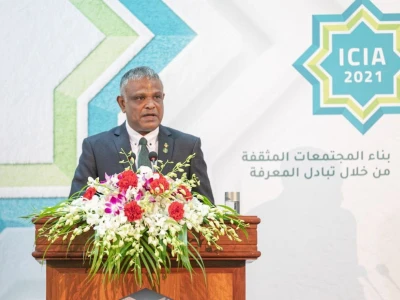
IUM research conference begins
IUM said that research papers on various fields regarding COVID-19 will also be presented.
By
Mariyam Umna Ismail
Islamic University of Maldives (IUM) on Saturday began its annual research conference.
Opening ceremony of the two-day International Conference on Intellectual Advancement (ICIA) was attended by planning minister Mohamed Aslam, Indian ambassador to the Maldives Munu Mahawar, and British high commissioner Caron Röhsler.
Speaking at the ceremony, Aslam said that back in their golden days, the Islamic empire pioneered learning and the love for knowledge, but that it has since changed.
"Today, the Muslim population in the world is 1.3 billion. However, the percentage of Muslims who have won the Nobel Prize in the fields of science is not even 1%. This is a matter of concern," he said.
Aslam said that power cannot be gained without knowledge, and that Muslims should spread around the world and make many new discoveries.
Also speaking at the ceremony, IUM Vice Chancellor Dr Ibrahim Zakariyya Moosa said that he hopes the conference will open doors to explore various fields of knowledge and encourage researchers to go further.
IUM has held this conference since 2016.
A large number of Maldivian and foreign scholars are attending this year's conference, with 48 research papers set to be presented.
Research papers will be presented at the conference on four main themes. The themes and their sub-themes are:
-
1-
Social sciences, humanities and education: education and curriculum, culture and heritage, linguistics, literature and languages; media and mass communication, health, nursing and social work, politics and diplomacy, international relations, and human rights and democracy.
-
2-
Quranic studies, sharia and law: Islamic legislature and international legislature, Quranic studies, contemporary issues in Islamic world and the Prophet’s leadership.
-
3-
Tourism, environment and technology: Halal tourism, climate change, sustainable development, and Information Communication Technology (ICT).
-
4-
Management, business, economy, accounting, finance and banking: Islamic finance, humans resource management, public administration and management, capital market, and marketing and branding.
Keynote speakers at this year's conference are:
-
Professor Dr Mohamed Dawood Bakr - former president of Islamic University of Malaysia and current chairman of the Sharia Advisory Council of the Central Bank of Malaysia,
-
Professor Dr Daoud Abdul Malik - Founder and former president of the University of Science and Technology, Sanaa, Yemen.
-
Professor Dr Mohamed Zia-ul-Haq - Director General of Islamic Research Institute at International Islamic University of Pakistan.




